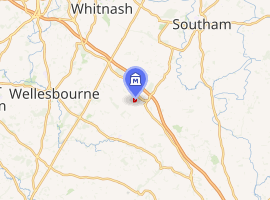British Motor Museum
The British Motor Museum in Warwickshire, England, holds the World's largest collection of historic British cars. There are over 300 classic cars on display from the British Motor Industry Heritage Trust and the Jaguar Heritage Trust.

| |
| Established | 1993 |
|---|---|
| Location | Banbury Road, Gaydon, Warwickshire, England |
| Type | Transport Museum |
| Nearest car park | On-Site Parking which is free |
| Website | www |
History
The collection, now cared for by the British Motor Industry Heritage Trust, was developed in the 1970s when a new division of the British Leyland Motor Corporation (BLMC) was formed to preserve and manage the company's collection of historic vehicles. In 1979, the company became BL Heritage Limited, adopting a new headquarters at Studley, Warwickshire. Two years later, a museum was opened at the London Transport Museum's former home of Syon Park, west of London, where some 100 vehicles from the collection were put on display.
During the early 1980s, closer ties were made with other British motor manufacturers. In 1983, the collection was granted charitable status, and became the British Motor Industry Heritage Trust, and although there were now several manufacturers involved, the collection still carried a large bias towards the former British Leyland companies. Austin-Rover continued as the primary backer of the Trust, and gradually the other companies withdrew their support. Meanwhile, the collection continued to grow.
In the late 1980s, it became evident that larger premises would be required as the collection developed. Several new sites were considered for a purpose built museum. The present location was chosen, on the site of the former RAF Gaydon airfield in South Warwickshire, which was home to the Rover Group's design, technology and testing ground. Plans were drawn up and construction began in 1991 for the new Heritage Motor Centre. Set in 65 acres (260,000 m2) of grounds, the centre brought together all of the Trust's operations for the first time, providing exhibition and storage space for the collection of over 250 vehicles and archive of over 2 million photographs, business records, brochures and drawings. The site also includes conference facilities.
When Rover Group was taken over by BMW in 1994, the British Motor Museum came under their ownership. Six years later, BMW sold the Rover Group, which meant that the Centre changed hands yet again, this time under the ownership of the Ford Motor Company. This latest change of ownership means that the Trust now had the opportunity to expand its collection to include all of the companies that have formed part of Britain's motor manufacturing history.
Following Jaguar's decision to close their Jaguar Daimler Heritage Centre, a small selection of the Jaguar Daimler Heritage Collection has been on display at the Museum.
In November 2015 the Heritage Motor Centre closed for a £1.1 million refurbishment, and reopened on 13 February 2016 under the new name of British Motor Museum.[1]
Vehicles in the collection
.jpg)
This is not an exhaustive list — a complete list is provided on the centre's website. Due to space limitations, not all cars are exhibited at all times.
- The very first Land Rover (1948)
- The first and last production models of the Land Rover Freelander
- Various Land Rover, Range Rover, and Rover P5 vehicles used by the British Royal Family and senior politicians
- An SAS Land Rover
- Prototype Land Rover 101 Recovery Truck
- Shaun the Sheep Land Rover Defender
- Land Rover Series 2 track wheeled off road vehicle
- Rare Land Rover Llama lorry
- The millionth Land Rover Discovery 4
- The first and last production models of the Rover 75
- Rover Gas Turbine cars
- The Metro 1.3 HLS as shown at the 1980 Motor Show
- Metro 6R4 Rally Car
- Various MG Speed Record cars
- The first Mini produced: 621 AOK
- The last Rover Mini Cooper produced (2000)
- The Minis that won the Monte Carlo Rally during the 1960s
- Various Mini based prototypes, such as the Minissima
- FAB1 from the Thunderbirds film
- An Ascari KZ1 show car from 2000
- Rolls-Royce Phantom
- The last Aston Martin DB7
- Aston Martin V12 Vanquish
- Sinclair C5
- Ford RS200
- The last production Austin Montego
- Ford Escort Mark I as used in the 1970 London to Mexico World Cup Rally
- Jaguar R1 Formula One racecar from 2000
- Nuffield Gutty prototype
Research services
The British Motor Museum offers a research and registry service for several British car marques. The Archive houses authentic historical records by many of the major car manufacturers, including a range of original factory ledgers which record the details of individual vehicles as they came off the production line. For a small fee, owners may send in their Vehicle Identification Number (VIN - aka chassis number) and/or engine numbers, and they will research the original production records for that vehicle and send back whatever information on the vehicle is available. This is a 'Certified Copy of a Factory Record' or more commonly known as a Heritage Certificate. This can include such details as a list of the options the car was ordered with, the original paint colour and any identification numbers that may be missing. This can be useful when applying for tax exemption or to obtain an age-related Registration Mark.
References
- "Heritage Motor Centre renamed as British Motor Museum". BBC News. BBC. 13 November 2015. Retrieved 22 February 2016.
External links
| Wikimedia Commons has media related to British Motor Museum. |
- British Motor Museum
- Classic Car Collection Gaydon Series of photos of the classic cars at the British Motor Museum